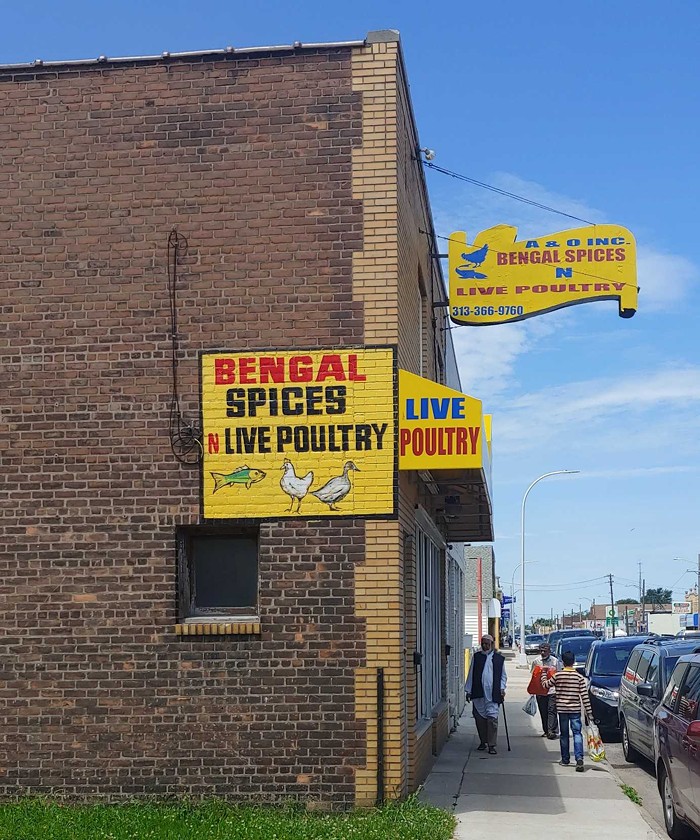
This happened a few days before this year's Fourth of July. The time is about 7 pm. The location is a Hamtramck restaurant in Detroit called Aladdin Sweets & Cafe. Sitting on the other side of the table is Chido Johnson, one of the most fascinating humans I have ever met. He is white, his parents are Americans, but he was raised as a black African in rural Zimbabwe. In his accent, I hear the domination of black African (or Shona) English on its white African and standard American English elements. He is a sculptor, the founder of the Zimbabwe Cultural Centre of Detroit, a cultural innovator. One of the modes of his complicated style is to constantly blend Detroit's urban culture with Zimbabwean culture. He is into wire cars. He has made an imbira that can send text messages. He never stopped surprising me.
We are waiting for food in Aladdin, a restaurant owned and run by Bengali immigrants. I ordered Fish Masala, and a beef Seekh Kebab (Bengali plates, which are similar to Indian ones, include beef because Bengalis tend to follow Islam rather than Hindu). Chido ordered a rice dish with chicken. Then this thing happens before our food arrives. A homeless black man walks into the restaurant. He looks terrible. Belly exposed, shorts in tatters, hair a mess, eyes red. He is just standing there expecting something from someone. And all I can think is that he will get his ass kicked out of here. The owner will call the cops if he does not leave. It's a tense moment. But I soon learn that this tense feeling has little to do with the actual situation, but the way my own city, Seattle, has become accustomed to feeling about homeless people.
IT TAKES JUST 30 SECONDS TO SWIPE LEFT ON HUMANITY & BECOME A DYSTOPIAN GHOUL pic.twitter.com/Foe1lX14WF
— Brett Hamil (@BrettHamil) July 20, 2019
One of the restaurant's workers approaches the homeless man, quietly talks to him, and he quietly leaves. I'm stunned. What had the restaurant's worker said to the homeless man to placate him? "They told him to come back in the morning. They feed people in need then," says Chido, as our plates arrive at the table. He then informs me that it's a part of Bengali culture to find ways to help the poor. They cannot be ignored. They must be offered something. The homeless man was not shamed or attacked. He was presented with a little compassion, and he accepted it and left the business in peace.
The incident undid me. My big question: Why had I become so hardened to believe that it would have an ugly ending, and maybe even ruin my meal, which turned out to be great by the way, particularly the fish dish?
My immediate reaction to the incident exposed how hardened my own city has become to the homeless issue, and the impact of this hardening has conditioned my own emotional system. In this sad city of ours, we now expect the persecution of poverty. It has become the ruling logic of the mayor's office, the powerful organizations that represent white homeowners on social media and political programs, the business leaders, and major media institutions. Make the poor really feel it. Give more power to the police (who apparently feel unloved at this moment) so that their sticks can hit poverty where it hurts with the greatest force possible. We live in that kind of city. Seattle today. It wants only to cut all of the links connecting the facts of the city's obscene abundance with its shocking poverty. It has as its mission the promotion of a social feeling that might not even be fit for an alligator. Certainly not for a gorilla.
From #SafeSeattle
“Future Mayor #SaulSpady” 🤣 pic.twitter.com/XQ1dectLfC
— Mister Jones (@deuceohsixx) July 17, 2019
Even emotionally stunted Saul Spady claims these hard policies are rational. But do not be fooled by this. There is no useful reasoning, in human terms, without emotional richness. He only wants to make the city even sadder than it already is.













